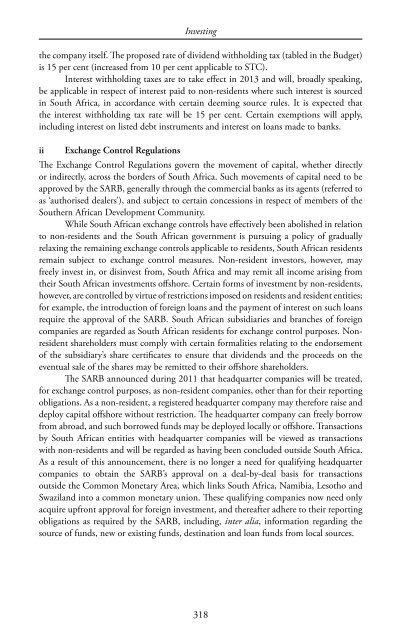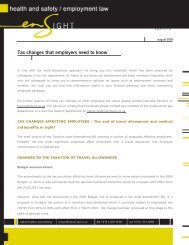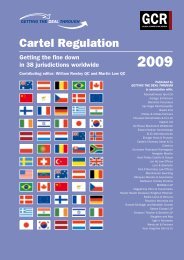The Private Equity Review - ENS
The Private Equity Review - ENS
The Private Equity Review - ENS
- No tags were found...
Create successful ePaper yourself
Turn your PDF publications into a flip-book with our unique Google optimized e-Paper software.
Investingthe company itself. <strong>The</strong> proposed rate of dividend withholding tax (tabled in the Budget)is 15 per cent (increased from 10 per cent applicable to STC).Interest withholding taxes are to take effect in 2013 and will, broadly speaking,be applicable in respect of interest paid to non-residents where such interest is sourcedin South Africa, in accordance with certain deeming source rules. It is expected thatthe interest withholding tax rate will be 15 per cent. Certain exemptions will apply,including interest on listed debt instruments and interest on loans made to banks.ii Exchange Control Regulations<strong>The</strong> Exchange Control Regulations govern the movement of capital, whether directlyor indirectly, across the borders of South Africa. Such movements of capital need to beapproved by the SARB, generally through the commercial banks as its agents (referred toas ‘authorised dealers’), and subject to certain concessions in respect of members of theSouthern African Development Community.While South African exchange controls have effectively been abolished in relationto non-residents and the South African government is pursuing a policy of graduallyrelaxing the remaining exchange controls applicable to residents, South African residentsremain subject to exchange control measures. Non-resident investors, however, mayfreely invest in, or disinvest from, South Africa and may remit all income arising fromtheir South African investments offshore. Certain forms of investment by non-residents,however, are controlled by virtue of restrictions imposed on residents and resident entities;for example, the introduction of foreign loans and the payment of interest on such loansrequire the approval of the SARB. South African subsidiaries and branches of foreigncompanies are regarded as South African residents for exchange control purposes. Nonresidentshareholders must comply with certain formalities relating to the endorsementof the subsidiary’s share certificates to ensure that dividends and the proceeds on theeventual sale of the shares may be remitted to their offshore shareholders.<strong>The</strong> SARB announced during 2011 that headquarter companies will be treated,for exchange control purposes, as non-resident companies, other than for their reportingobligations. As a non-resident, a registered headquarter company may therefore raise anddeploy capital offshore without restriction. <strong>The</strong> headquarter company can freely borrowfrom abroad, and such borrowed funds may be deployed locally or offshore. Transactionsby South African entities with headquarter companies will be viewed as transactionswith non-residents and will be regarded as having been concluded outside South Africa.As a result of this announcement, there is no longer a need for qualifying headquartercompanies to obtain the SARB’s approval on a deal-by-deal basis for transactionsoutside the Common Monetary Area, which links South Africa, Namibia, Lesotho andSwaziland into a common monetary union. <strong>The</strong>se qualifying companies now need onlyacquire upfront approval for foreign investment, and thereafter adhere to their reportingobligations as required by the SARB, including, inter alia, information regarding thesource of funds, new or existing funds, destination and loan funds from local sources.318





